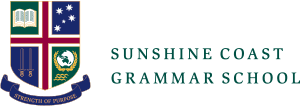At Sunshine Coast Grammar School we invest in our greatest resources – our people and encourage professional excellence in all staff. Teachers who are the leaders in their field, committed to their purpose of educating young people, and who are genuinely passionate about their work.
Grammar’s Music staff are no exception and are dedicated to the music education of all students in the classroom, in our instrumental programs, and in our ensembles.
Music Teachers, Cassandra Maxwell and Simon Eastwood recently attended a professional development course, Bigger Better Brains by Dr Anita Collins.
Dr Collins is an award-winning educator, researcher, and writer in the field of brain development and music learning and is a huge advocate for understanding how music learning can benefit every child’s development. Bigger Better Brains is an accredited educational program specifically written for music educators.
Always inspiring, Dr Collins’ seminars are a wonderful opportunity to induce robust discussion about what we do well and the things we can improve on or approach differently.
Primary Music Teacher, Cassandra Maxwell had the opportunity to present at Teachmeet, Sunshine Coast about how she is putting her learnings from the accredited program into practice in her music classroom.
‘When a student learns an instrument, they are exposed to a powerful learning environment. The benefits of learning to be a musician are endless,’ said Cassandra.
‘Something as simple as clapping a steady beat takes a lot of cognitive control and recent findings in the field of neuromusicology and literacy development have found a distinct link in the ability to clap a steady beat and readiness for learning to read.’
The music lessons at Grammar Early Learning Centre and Sunshine Coast Grammar School is assisting students in their literacy development, aural development and further developing those neural pathways to give each student a ‘bigger better brain’ through music.
At Grammar Early Learning Centre, our Kindergarten children have the opportunity to participate in three weekly singing sessions and instrumental lessons, where they play instruments, learn to keep and differentiate the beat and basic concepts of music such as fast/slow, high/low through stories, song, and movement.
In the field of neural brain development, there have been unequivocal findings of the impact that music exposure has in opening up neural pathways in the brain and further developing neural ‘connections’ all over the brain. This is especially impactful on young children.
Students who study Music at Grammar gain insight, discover sensibility and learn to balance self-discipline with artistic freedom. The study of Music develops an enduring love of and lifelong involvement with music.
